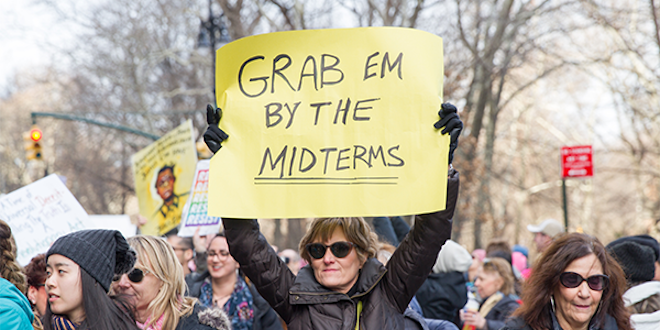Election deniers get elected
Roger Fitch in Washington takes a close look at the mid-term results ... Abortion probably played a bigger role than the Big Lie ... Pre-election meddling by the Supreme Court ... Not all the crazies lost ... The Republican House has inquisitions planned ... Voting rights and abortion protected in some state ballots
 The Democrats have maintained control of the senate, possibly increasing it, but lost the house.
The Democrats have maintained control of the senate, possibly increasing it, but lost the house.
The house result was predicted: it's usual in non-presidential election years for lemming-like voters to punish the incumbent president's party for perceived policy failures mostly attributable to obstruction by the party they now vote for. But more was involved than unworldly and uninformed citizens.
Echoing Bush v Gore, the Republican-aligned supreme court intervened in the elections, this time before election day. Through shadow docket orders made without briefing or oral argument, the court rigorously applied its Purcell principle to allow use, this year, of Republican-gerrymandered voting districts already rejected as unconstitutional.
Prior supreme court rulings liberating campaign contributions from regulation fuelled campaign costs exceeding $16.7 billion.
While other factors (inflation, high petrol prices) played a part, it was the outdated and gerrymandered districts that delivered a rigged house majority to a "destructionist" Republican Party.
Before the election, the "wildcard" was thought to be the Big Lie, the imaginary theft by Mr Biden of the 2020 election, credulously believed by Trump supporters; in fact, it may have been abortion.
In the event, the Republican "red wave" in congress, arrogantly assumed by media, never materialised. The Democrats' off-year loss of house seats was minor compared to the midterm defeats of the last three presidents.
Some of the Democrats' losses were own goals: in New York, the defeat of incumbent Democrats could be attributed to the conservatives and Republicans appointed to New York's top court by the deal-making, now-ousted, Democrat governor Andrew Cuomo; the result was new voting districts gerrymandered to benefit minority Republicans, who picked up a stunning four seats in a liberal Democrat stronghold.
The Democratic National Committee supported extreme Republican primary candidates on the theory that they would be easier to defeat in the general election, and this risky ploy largely worked. Who were these Republican candidates?
According to the Atlantic, Republicans had been "forced to lower their- and our - standards for admission to public office, because the destruction of dignity is the only way they can find the candidates who will do what decent men and women will not, including abasing themselves to Donald Trump."
To its credit, the media reported some of the more unbalanced Republican nominees for congress, e.g, Ohio's JR Majewski, a "Trump-backed lawn painter" who wanted to "abolish all unconstitutional three letter agencies," including the FBI.
Majewski lost, but two of the other "five craziest" Republican candidates for congress have been elected: George Santos in New York and Derrick Van Orden in Wisconsin, the latter a veteran of the January 6 disturbances.
On the Washington Monthly's list of 10 worst candidates (including two crazies from the above list), all of them (except Texas AG Ken Paxton, see below) lost, including the alarming Republican candidates for secretary of state (election supervisor) in Nevada and Arizona.
The worst Trump candidates for the house (Washington State's Joe Kent), senate (Pennsylvania's Mehmet Oz) and governor (Michigan's Tudor Dixon, Pennsylvania's Doug Mastriano and almost certainly, Kari Lake in Arizona), lost, but some Trumpistes won: Nevada's new governor Joe Lombardo and Ohio senator JD Vance. Georgia senate candidate Herschel Walker could possibly win.
So the house has fallen, as predicted, to gerrymandering Republicans and some Trump acolytes. What will follow in a Republican house? Well, inquisitions are planned, and Mother Jones is not optimistic. But with Democrats in charge of the senate and the White House, Americans will be spared the scary new laws Republicans were proposing , schemes that Trump still plans for 2025.
Meanwhile, all is not lost for Republican radicals: the counter-revolution will proceed in the judicial branch, where a wholesale dismantling and remodelling of the constitution is being engineered by the most conservative supreme court since 1931.
 Trump: down for the count
Trump: down for the count
≈ ≈ ≈
Some of the election results:
• Wisconsin, the Republican "laboratory for dismantling democracy", has re-elected Senator Ron Johnson, the most ignorant and (after Ted Cruz) obnoxious US senator. However, the party failed to obtain the veto-proof legislature needed to frustrate its re-elected Democrat governor, Tony Evers, whose opponent had promised permanent Republican government.
• In Florida, a 25-year-old Afro-Cuban Democrat became the first member of "Gen Z" elected to congress;
• Maryland chose its first African-American governor, the Oxford-educated Democrat Wes Moore;
• Democrats made significant gains in state legislatures and governors;
• The Democrats flipped a senate seat in Pennsylvania while keeping those in Arizona and Nevada;
• The top cop in Las Vegas has been elected Republican governor of Nevada;
• Ohio elected a Trump-endorsed Republican senator (JD Vance) to an open Republican seat;
• Georgia will hold a run-off for the senate as neither the Democrat incumbent or his woeful Republican opponent obtained 50% of the vote, and Georgia doesn't have preference voting (in the US, "ranked-choice" or "instant run-off" voting);
• Alaska has ranked choice, and will hold a further election this month where four qualifying candidates from November 8th compete (the top two contenders are both Republicans);
• America's worst state attorney general, Ken Paxton, has won his second four year re-election since being indicted for securities fraud; and
• America's most partisan "secretary of state", Kris Kobach, will now make trouble as Kansas Attorney General.
Supported by Big Money, more than half of the Republican candidates for office this year spouted the stolen election claim, and 200 election-deniers (including new Ohio senator Vance) were elected, but voters rejected most of the worst, e.g, New Hampshire senate aspirant Brig Gen (ret) Don Bolduc.
 Female voters proved critical
Female voters proved critical
Even so, the "Sedition Caucus" has grown: so far, 145 Republican election-deniers have been elected to the house, a larger group than the 139 Republicans who fought against counting official electoral votes following the January 6 Capitol invasion.
Some of the most frightening election deniers were those seeking to supervise elections, but they failed to be elected in key states such as Michigan.
There were five Republican candidates for state election supervisors who claimed Democrats only win by cheating, and all of them appear to have lost. If any had won, they would have been well-positioned to wreak maximum mischief for Herr Trump in the 2024 presidential election.
Courts are the only thing still standing in the way of complete election subversion. Curiously, however, election-denying officials still don't seem to realise they can face criminal charges for misconduct. Their post-election lies can also invite defamation claims.
State ballot initiatives to protect voting and abortion rights have succeeded. In California, Michigan and Vermont, abortion rights have been entrenched in the state constitution, and Kentucky voters rejected a constitutional amendment that sought to prevent courts recognising the right to abortion.
More ballot measures here and here.
No comments:
Post a Comment